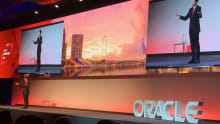Technology can make HR feel more personalized and human:Emily He, Oracle

Let’s Talk Talent Read similar articles

There is no doubt that HCM technologies will continue to disrupt the world of work. Emerging technologies will continue to change business strategies, eliminate some of the current job roles and create new work opportunities. Amidst this change, how can an organization drive business values through an innovative HR? How can organizations implement cutting edge HCM technologies and yet keep the humane in digital HR?
These are some of the questions which Oracle OpenWorld Asia to be held at Singapore from 26-27 March 2019 will aim to answer through a bevy of innovators, disruptors, and thought leaders at the conference. In an exclusive interaction with People Matters, Emily He, Senior Vice President, Human Capital Management Cloud Business Group, Oracle sheds light on what role will HCM play in shaping the future workforce.
How has the role of HCM evolved for businesses over the past few years?
Let me begin by explaining what is Human Capital Management (HCM). HCM can refer to both a business strategy and a set of modern IT applications and technologies used to implement that strategy.
We all know that Human Resources (HR) refers to a set of employee management functions that includes hiring, job and position management, global HR compliance, and reporting. HCM on the other hand, encompasses the same processes, but also includes workforce rewards and talent and workforce management.
With HCM, it transforms the traditional administrative functions of HR departments – recruiting, training, payroll, compensation, and performance management – into opportunities to drive engagement, productivity, and business value. HCM considers the workforce as more than just a cost of doing business; it is a core business asset whose value can be maximized through strategic investment and management – just like any other asset.
Today, we call this decade the Golden Age of HCM. New digital technologies are enabling HR leaders to provide a more engaging and personalized employee experience at scale. At the same time, emerging technologies, such as data automation, predictive analytics, and artificial intelligence (AI), have added new innovations for understanding, managing, incentivizing, and engaging the workforce. And HR leaders have a whole new set of tools that can maximize the value of their workforce, from intelligent, social-driven recruiting and personalized retention practices to highly optimized compensation.
What should be the key factors when deciding on a digital transformation agenda for your organization?
Quoting Andy Campbell, Oracle’s HCM Strategy Director, “Transformation is an orchestrated effort to change strategy, process, policy, organizational structure, vendor agreements and technology concurrently. It is radically different from evolutionary change.”
Whenever an organization discusses transformation, they should look at both internal and external factors challenging it. Internal factors could include how difficult it is to implement new and emerging technologies to enable business innovation, and cultural resistance to change, i.e. while the technology might be feasible, the corporate culture is not ready to embrace it. Of course, there comes the question of cost. Some technology might be too expensive to implement, and this makes running of analytic simulations of a range of scenarios critical to figuring this out.
On the other hand, external factors include the increasingly competitive global business environment putting pressure on an organization to change, and the rapid technological development and disruption creating a need for an organization to transform.
What innovative HR practices can help companies to drive their business values?
I always find it interesting yet a natural pick up when the future of HR is built of social media principles. The Asia Pacific is home to 1.8 billion social media users, who are the most voracious in the world in terms of hours per day. It’s clear that social media is not just any technology, but one that has transformed how we connect to each other and the world around us.
As social media continues to dominate our personal lives, businesses can boost employee satisfaction by making HR processes more similar to social media.
From personalized updates via a newsfeed-style interface, to proactive training recommendations derived from data, to automated chatbots that offer quick answers to HR questions, the next wave of workplace technology is set to revolutionize how businesses attract, retain and engage talent in countries across the Asia Pacific region.
For instance, in the Philippines, UnionBank is modernizing HR practices with cloud technology. With automated processes, employees now have more autonomy over managing their own development and performance in alignment with the business’s goals. The result has been more engaged and enthusiastic employees who are capable of delivering better service to customers.
How can technology be used to keep the human factor alive in the digital era of HR?
Emerging technologies like Artificial Intelligence (AI) will allow the HR function to be smarter, faster, and more agile. In fact, with the help of technologies, it will help make HR feel more human and personalized – be it recruitment, employee engagement, or training and education.
A simple example is how technologies can help sift through numerous résumés and millions of digital or social conversations for recruitment purposes – something that cannot be achieved at the human level. However, with AI tools, they can complement humans and make that process much more effective and efficient.
As a result, HR can uncover incredible information that they might not be able to search for before. Technologies can also help identify hiring patterns, drive employee engagement, build and improve on education programs, and spot trends in sick leaves or turnover rates. AI can even automate the scheduling of interviews and juggling of multiple calendars.
For instance, Chinese automotive electronics company, Yanfeng Visteon, implemented Oracle HCM Cloud to modernise its human resources operations, benefiting more than 4,000 employees and consolidating 25 HR processes into one platform. The automation offered by Oracle HCM Cloud has actually made it possible to develop a more human HR experience for employees and combine it with an intelligent HR platform for its management team. Bringing data together across the business, the technology is rolled out in phases – starting with core HR and payment processes, moving on to recruitment and performance, and finally training, talent and compensation. By consolidating data on one portal, managers and employees can access the HR information they need and get on with their day-to-day work with far less hassle.
What are some of the key technology trends you see across the HR function globally?
Last year, the 2018 Deloitte Global Human Capital Trends report revealed that there is a rapid rise in social enterprise – a shift that reflects the growing importance of social capital in shaping an organization’s purpose, guiding its relationships with stakeholders, and influencing its ultimate success or failure.
In other words, organizations are no longer assessed based only on traditional metrics such as financial performance, or even the quality of their products or services.
Rather, organizations today are increasingly judged on the basis of their relationships with their workers, their customers, and their communities, as well as their impact on society at large – transforming them from business enterprises into social enterprises.
For instance, the work experience of an individual becomes the focus moving forward. Instead of focusing on having steady career progression, organizations are gradually shifting towards a model that empowers the individual to gain valuable experiences, explore new roles, and constantly reinvent themselves. Such a shift is critical to attract new talents, retain existing talents, and is exceptionally crucial at a time when technology shifts the skills landscape.
Another trend observed is that the HR function has become more data-intensive and data-driven. The broader HR strategy tends to involve lots of data, including those about employees, by employees and for employees. This gives the organization a lot of actionable insights to work on. As such, the trend moving into the future of HR is that digital transformation must be able to manage this heavy pool of data in a way that can be shared with the other functions within an organization, providing better visibility into the broader business performance.
What role will HCM technologies play in shaping the future workplace?
HCM technologies have and will continue to disrupt the world of work. New and emerging technologies will continue to change business strategies, eliminate job roles and create new work opportunities. While the traditional HR function is changing, the future workforce is also transforming – into a flatter, more agile networks of teams, more mobile, diverse, and global than before.
With technology, organizations can expect to see the adoption of familiar technologies such as Software-as-a-Service (SaaS), mobile, machine learning, and AI in the HR function.
• Mobile increases engagement and productivity by empowering HR, workers, and managers with consumer-grade, self-service mobile apps.
• Social improves productivity for everyone when they are able to collaborate with peers and mentors in the organization.
• Digital assistants serve constituents faster and more efficiently with answers.
• AI augments what is not humanly possible, such as the quick mining of thousands of résumés and data points to find the best candidates.
As technology changes the nature of jobs, what do organizations need to focus on to future-proof their talent and stay ahead of the curve in the war for talent?
As the talent war intensifies, worsening skills shortage and social recruiting tools make it easier than before for employees to change jobs, the HR function within an organization must align their HCM, data and talent strategies around these trends to create great employee experiences that serve its customers and business best.
These are some tips the modern HR should think about:
• Reimagine talent management processes and focus on delivering superior employee experience to the end user.
• Deliver HR and talent services in the cloud to take advantage of a faster pace of innovation.
• Leverage emerging technology, such as AI and digital assistant, to cultivate a culture of innovation and support a more modern employer brand.
Click here to register for the Oracle OpenWorld Asia: Singapore happening at Marina Bay Sands, Singapore from 26-27 March 2019.







